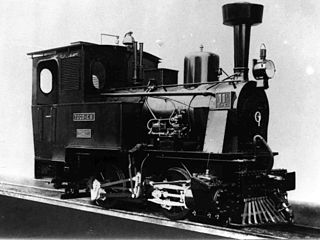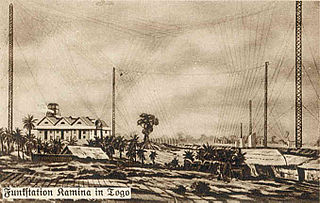Related Research Articles

Togo, officially the Togolese Republic, is a country in West Africa. It is bordered by Ghana to the west, Benin to the east and Burkina Faso to the north. It extends south to the Gulf of Guinea, where its capital, Lomé, is located. It covers about 57,000 square kilometres with a population of approximately 8 million, and has a width of less than 115 km (71 mi) between Ghana and its eastern neighbor Benin.
The history of Togo can be traced to archaeological finds which indicate that ancient local tribes were able to produce pottery and process tin. During the period from the 11th century to the 16th century, the Ewé, the Mina, the Gun, and various other tribes entered the region. Most of them settled in coastal areas. The Portuguese arrived in the late 15th century, followed by other European powers. Until the 19th century, the coastal region was a major slave trade centre, earning Togo and the surrounding region the name "The Slave Coast".

Sylvanus Épiphanio Olympio was a Togolese politician who served as prime minister, and then president, of Togo from 1958 until his assassination in 1963. He came from the important Olympio family, which included his uncle Octaviano Olympio, one of the richest people in Togo in the early 1900s.

Togoland was a German Empire protectorate in West Africa from 1884 to 1914, encompassing what is now the nation of Togo and most of what is now the Volta Region of Ghana, approximately 90,400 km2 in size. During the period known as the "Scramble for Africa", the colony was established in 1884 and was gradually extended inland.

Atakpamé is the fifth largest city in Togo by population, located in the Plateaux Region of Togo. It is an industrial centre and lies on the main north-south highway, 161 km north of the capital Lomé. It is also a regional commercial centre for produce and cloth.

French Togoland was a French colonial League of Nations mandate from 1916 to 1960 in French West Africa. In 1960 it became the independent Togolese Republic, and the present day nation of Togo.

The coat of arms of Togo was adopted on 14 March 1962. Since this Togolese national symbol does not follows the rules of heraldry for a traditional coat of arms, then it could be considered a national emblem instead.

This is a survey of the postage stamps and postal history of Togo.

The Togoland Campaign was a French and British invasion of the German colony of Togoland in West Africa, which began the West African Campaign of the First World War. German colonial forces withdrew from the capital Lomé and the coastal province to fight delaying actions on the route north to Kamina, where the Kamina Funkstation linked the government in Berlin to Togoland, the Atlantic and South America.

The Affair of Agbeluvoe (Agbéluvhoé, Beleaguer or the Battle of Tsewie, was fought during the First World War between invading British Empire soldiers of the West African Rifles and German Polizeitruppen in German Togoland on 15 August 1914. British troops occupying the Togolese capital of Lomé on the coast, had advanced towards a wireless station at Kamina, 100 mi inland on hills near Atakpamé. The only routes inland were by the railway and road, which had been built through dense and almost impassable jungle.

The Affair of Khra [Chra] was fought by British and French troops against German Polizeitruppen in the village of Khra, near the Khra River on 22 August 1914, during the Togoland Campaign of the First World War. The German defenders mined the approaches to the river, blew the bridges and dug in around the village on the far bank, ready to defend the crossing with rifles and three concealed machine-guns. The British-French attack was repulsed and then a German counter-attack was ordered but many troops refused the order and the attack was not delivered.
Prostitution in Togo is legal and commonplace. Related activities such as solicitation, living off the earnings of prostitution or procuring are prohibited. Punishment is up to 10 years imprisonment if minors or violence is involved.

Rail transport in Togo began in 1905.

Kamina Funkstation was a wireless transmitter in the German-occupied colony of Togoland in West Africa. The wireless station was built by Telefunken near the village of Kamina, in Togoland, where the nearest large settlement was Atakpamé. The transmitter was built by Telefunken, on behalf of the German government from 1911 to 1914. The station was designed as a node and switching point for other German colonial radio stations. Shortly after the beginning of the First World War, Togoland was invaded by British and French forces from the neighbouring colonies of Gold Coast (Ghana) to the west and French Dahomey (Benin) to the east. The station was destroyed by the operators to prevent it from coming under British and French control.
The following is a timeline of the history of the city of Lomé, Togo.
Karl Weule was a German geographer, ethnologist and museum director.

Jan Vermeulen, the Miller of Flanders is a 1917 German silent war drama film directed by Georg Jacoby. It was made as a propaganda film by the German film agency BUFA, which generally specialised in making documentaries but also made feature films such as this and Dr. Hart's Diary.
Christelle Aquéréburu is a Togolese filmmaker. She is founder-director of the film school Ecole de cinéma au Togo (ECRAN), and director of the audio-visual production company African Dreams.

The Ghana–Togo border is 1,098 km in length and runs from the tripoint with Burkina Faso in the north to the Atlantic Ocean in the south.

Togolese nationality law is regulated by the Constitution of Togo, as amended; the Togolese Nationality Code, and its revisions; the Code of Persons and Family; the Children's Code; and various international agreements to which the country is a signatory. These laws determine who is, or is eligible to be, a national of Togo. The legal means to acquire nationality, formal legal membership in a nation, differ from the domestic relationship of rights and obligations between a national and the nation, known as citizenship. Nationality describes the relationship of an individual to the state under international law, whereas citizenship is the domestic relationship of an individual within the nation. Togolese nationality is typically obtained under the principal of jus sanguinis, i.e. by birth in Togo or abroad to parents with Togolese nationality. It can be granted to persons with an affiliation to the country, or to a permanent resident who has lived in the country for a given period of time through naturalization.
References
- ↑ Wolfgang Fuhrmann (2015). Imperial Projections: Screening the German Colonies. Berghahn Books. pp. 45–7. ISBN 978-1-78238-698-8.
- ↑ Richard Abel (2005). Encyclopedia of Early Cinema. Taylor & Francis. p. 14. ISBN 978-0-415-23440-5.
- ↑ Wolfgang Fuhrmann (2015). Imperial Projections: Screening the German Colonies. Berghahn Books. pp. 188–9. ISBN 978-1-78238-698-8.
- ↑ Wolfgang Fuhrmann (2015). Imperial Projections: Screening the German Colonies. Berghahn Books. pp. 249–. ISBN 978-1-78238-698-8.
- ↑ James E. Genova (2013). Cinema and Development in West Africa. Indiana University Press. pp. 26–27. ISBN 978-0-253-01011-7.
- ↑ Nolwenn Mingant; Cecilia Tirtaine, eds. (2017). "The Film Code 'will promote the development of the film industry and make Togolese cinema visible and competitive internationally: An interview with Komi Ati". Reconceptualising Film Policies. Taylor & Francis. pp. 316–. ISBN 978-1-351-74758-5.
- 1 2 Toyin Falola; Daniel Jean-Jacques, eds. (2015). "Togo (Togolese Republic)". Africa: An Encyclopedia of Culture and Society [3 volumes]: An Encyclopedia of Culture and Society. ABC-CLIO. p. 1225. ISBN 978-1-59884-666-9.
- ↑ Beti Ellerson, Christelle Aquéréburu, Directrice de l’ECRAN - Ecole de cinéma au Togo | Director of ECRAN film school in Togo, 15 April 2014
- ↑ Amelia Nakitimbo, Togolese film industry back on the international scene